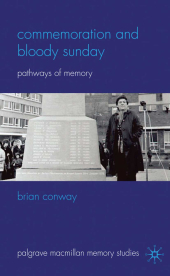 Neuerscheinungen 2010Stand: 2020-01-07 |
Schnellsuche
ISBN/Stichwort/Autor
|
Herderstraße 10
10625 Berlin
Tel.: 030 315 714 16
Fax 030 315 714 14
info@buchspektrum.de |

B. Conway
Commemoration and Bloody Sunday
Pathways of Memory
1st ed. 2010. 2010. xxvii, 213 S. 24 SW-Abb. 216 mm
Verlag/Jahr: SPRINGER PALGRAVE MACMILLAN; PALGRAVE MACMILLAN UK 2010
ISBN: 1-349-31032-8 (1349310328)
Neue ISBN: 978-1-349-31032-6 (9781349310326)
Preis und Lieferzeit: Bitte klicken
In this wide-ranging study of the politics of memory in Northern Ireland, Brian Conway examines the ´career´ of the commemoration of Bloody Sunday, and looks at how and why the way this historic event is remembered has undergone change over time. Drawing on original empirical data, he provides new insights into the debate on collective memory.
List of Tables and Figures Preface Acknowledgements Abbreviations Chronology Introduction: People Remembered Bloody Sunday in Historical Context A ´Simple People Who Want a Simple Memorial´ On the March ´The Holocaust That Was the Bogside of Sunday´ The Politics of Visual Memory Conclusion: Trajectories of Memory Methodological Appendices Notes References Index
´Brian Conway´s Commemoration and Bloody Sunday is an exemplary account of the memory of trauma. As he explains how the reality of trauma limits the effects of agency, contexts, and narrative, Conway reorients collective memory scholarship from an interest-driven model of "constructions" toward a more precise, data-driven, model of meaning, distortion, and reality. If one book best represents the new generation of memory theory and research, it is Commemoration and Bloody Sunday.´ - Professor Barry Schwartz, Department of Sociology, University of Georgia, USA
´A rich account which C. Wright Mills would have approved of, linking private troubles and public issues. The "career" of Bloody Sunday commemoration is mapped out with precision. Brian Conway portrays collective memory as virtually a living thing, changing to accommodate developments in the aspirations and goals of those who continue to remember the original traumatic event.´ - Bill Rolston, School of Sociology, University of Ulster, UK
BRIAN CONWAY is Lecturer in the Department of Sociology at the National University of Ireland Maynooth.


